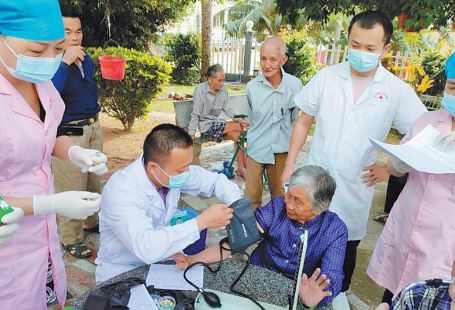Medics battle COVID-19 in the countryside
Fever cases rising

A doctor checks a woman's blood pressure before she receives a COVID-19 vaccination in Huiwen town, Wenchang, Hainan province. PHOTO PROVIDED TO CHINA DAILY
Liu Daoguang, director of a township hospital in Shaoyang, Hunan province, is racking his brains about buying anti-fever drugs.
"We ran out of Ibuprofen yesterday. Supplies of alternative drugs are also running low," Liu said on Thursday. "We contacted seven pharmaceutical companies, but failed to replenish our stocks."
There are more than 40 workers at the central hospital in Xiaoshajiang township, Longhui county, Hunan, including a dozen doctors. They serve the entire township, which boasts 14 villages with a total population of 26,000.
Liu said the health workers see more than 20 fever patients every day, and the number is continuing to rise.
The patients are now treated with other remedies for colds, physical cooling, and traditional Chinese medicine, as well as being given emergency intramuscular antipyretic drugs.
Liu said: "We have a limited number of medical staff. Many doctors have not had a break for a month or two. Even though more than 10 workers tested positive for COVID-19, some of them, including the deputy director, continue to work instead of taking a rest."
The condition of patients is seldom so severe that they need to be hospitalized, and Liu said the inpatient unit is now free from infections.
The hospital is about 1,350 meters above sea level, and the temperature is about 6 or 7 degrees Celsius lower than that in the county town, which is about 90 kilometers away.
"For critically ill patients, their condition might be more severe than for those living in low-altitude areas," Liu said, adding that more attention is being paid to prevent such cases emerging after infection, especially among those with underlying medical conditions, the elderly and infants.
Liu said there is a medical team for each village. For many years, these workers have made regular home visits to patients — mainly those with conditions such as diabetes, tuberculosis, psychosis and hypertension.
These teams now also provide health monitoring and consultation services based on patients' needs, deliver medicine to them, and provide guidance.
"These patients will be hospitalized if we find their condition is severe. In addition, we will prepare for them to be transferred immediately to hospitals in the county town, where there are better medical conditions," Liu said.
In the past two weeks, five patients have been transferred to hospitals in the county town.
Liu expects the biggest near-term pressure to come during Spring Festival next month, when people working outside the area return home for family reunions.
Many residents from Longhui county are migrant workers in factories in the Pearl River Delta, including most of the young people from Xiaoshajiang township, who account for about one-third of the town's population.
"With such a large number of people returning home, we're preparing for a spike in infections," Liu said.
Health monitoring guidance for families with vulnerable members is being stepped up to reduce the number of critically ill patients.
"In particular, we need to prevent medical staff members from being unable to work if they become infected at the same time, and reserve more staff," Liu said.
